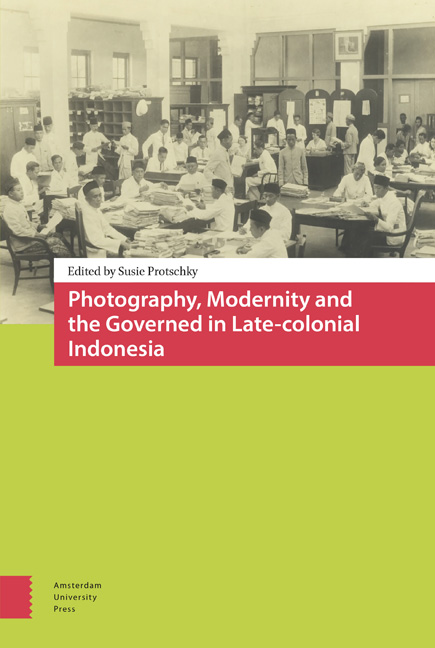Book contents
- Frontmatter
- Contents
- Acknowledgments
- Part I Governing Lenses on Ethical Policy and Practice
- 1 Camera Ethica: Photography, modernity and the governed in late-colonial Indonesia
- 2 Ethical policies in moving pictures: The films of J.C. Lamster
- 3 Ethical projects, ethnographic orders and colonial notions of modernity in Dutch Borneo: G.L. Tichelman's Queen's Birthday photographs from the late 1920s
- 4 Saving the children?: The Ethical Policy and photographs of colonial atrocity during the Aceh War
- Part II Local Lenses on Living in an “Ethical” Indies
- 5 Interracial unions and the Ethical Policy: The representation of the everyday in Indo-European family photo albums
- 6 Reversing the lens: Kartini's image of a modernised Java
- 7 Modelling modernity: Ethnic Chinese photography in the ethical era
- 8 Modernity and middle classes in the Netherlands Indies: Cultivating cultural citizenship
- 9 Say “cheese”: Images of captivity in Boven Digoel (1927-43)
3 - Ethical projects, ethnographic orders and colonial notions of modernity in Dutch Borneo: G.L. Tichelman's Queen's Birthday photographs from the late 1920s
Published online by Cambridge University Press: 11 December 2020
- Frontmatter
- Contents
- Acknowledgments
- Part I Governing Lenses on Ethical Policy and Practice
- 1 Camera Ethica: Photography, modernity and the governed in late-colonial Indonesia
- 2 Ethical policies in moving pictures: The films of J.C. Lamster
- 3 Ethical projects, ethnographic orders and colonial notions of modernity in Dutch Borneo: G.L. Tichelman's Queen's Birthday photographs from the late 1920s
- 4 Saving the children?: The Ethical Policy and photographs of colonial atrocity during the Aceh War
- Part II Local Lenses on Living in an “Ethical” Indies
- 5 Interracial unions and the Ethical Policy: The representation of the everyday in Indo-European family photo albums
- 6 Reversing the lens: Kartini's image of a modernised Java
- 7 Modelling modernity: Ethnic Chinese photography in the ethical era
- 8 Modernity and middle classes in the Netherlands Indies: Cultivating cultural citizenship
- 9 Say “cheese”: Images of captivity in Boven Digoel (1927-43)
Summary
In the closing years of the 1920s, Gerard Louwrens Tichelman (1893-1962), a colonial official stationed in the southeast of Dutch Borneo (present-day Kalimantan), assembled three family photograph albums filled with diverse scenes from his daily personal and working life. Recurring throughout these albums were images of celebrations for Koninginnedag, or Queen's (Birth) Day, an event that many other Europeans in the Netherlands Indies also commemorated in family photographs during the early twentieth century. Despite the frequency of such images, and the acknowledged political and cultural significance of Queen's Day festivals in late-colonial Indonesia, this genre of family photographs has largely escaped historical analysis. Unusually, Tichelman also pasted photographs of the festival into his official logbook (dagboek) containing monthly reports to the Resident, the Dutch governor of the district. Such a use of photographs was rare in the reports of lower administrators from the Outer Provinces (Buitengewesten) in the 1920s.
What was it about Koninginnedag that inspired G.L. Tichelman to photographically document the occasion, not just for his own private purposes but also for his government colleagues? And what modes of looking permeate the photographs in the two venues that Tichelman chose to commemorate the festival? How does Tichelman's gaze enframe and constitute the occasion, and to what ends?
The key to addressing these questions in Tichelman's photography lies in examining the broader connections between the Ethical Policy, Queen Wilhelmina of the Netherlands and governing practices in the Outer Provinces in the early twentieth century. It was during the reign of Wilhelmina (1898-1948) that the House of Orange, which had been involved in Dutch colonial expansion since the seventeenth century, emerged as the key symbolic figurehead of the Dutch imperium, particularly in the Netherlands Indies. Here, Wilhelmina's name also became synonymous with the Ethical Policy after she outlined new terms of reference for Dutch rule of the Indies in her annual address to parliament (the troonrede, or “speech from the throne”) in 1901. Only a few sentences of the oration referred to the Indies, but they included the pillars of what would define the policy: an inquiry into the “diminished welfare” (mindere welvaart) of the Javanese, decentralisation of the colonial administration, and further “pacification” of north Sumatra.
- Type
- Chapter
- Information
- Publisher: Amsterdam University PressPrint publication year: 2015



